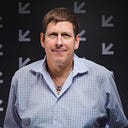Ash Carter: March 9 at SXSW 2019
The Forrest Four-Cast: Feb 20, 2019
Scheduled March 8–16 in Austin, SXSWeek brings together hundreds of top industry experts from across the United States and around the world. Stay tuned to this space over the next few days as we interview and highlight some of the most interesting speakers on the 2019 schedule.
This series begins with Ash Carter, who be part of a dual presentation with Booz Allen Hamilton CEO Horacio Rozanski. Titled “Answering the Call: Tech for Public Purpose,” this session is scheduled for 11:00 am on Saturday, March 9 at the Courtyard Marriott.
Carter is a former United States Secretary of Defense and the current Director of the Belfer Center for Science and International Affairs at Harvard Kennedy School, where he leads the Technology and Public Purpose project. He is also an Innovation Fellow and corporation member at MIT. For over 35 years, Secretary Carter has leveraged his experience in national security, technology, and innovation to defend the United States and make a better world. He has done so under presidents of both political parties as well as in the private sector.
At SXSW 2019, you are part of a March 9 presentation titled “Answering the Call: Tech for Public Purpose.” Can you give us a little bit more context on what this session will cover?
This presentation outlines the vision behind my ambitious Technology and Public Purpose Project at Harvard Kennedy School’s Belfer Center for Science and International Affairs. I’m concerned that the arc of innovation has reached an inflection point: technological change brings a lot of good, but in many areas it now threatens to overwhelm us. It is impossible to halt this process of discovery, but we must shape it for public good. We ourselves in the public-spirited tech community — not just market forces — must manage it.
You’ve visited Capital Factory in Austin a few times. Given that context, what is your impression of the Central Texas startup scene?
Austin is one of the nation’s and world’s great tech hubs. That’s why I established a DIUx outpost there, and why the Army chose it for its Futures Command.
Post Cambridge Analytica, we have a much better understanding of how easily social media can be manipulated for nefarious purposes. With these problems as a backdrop, do you think that there should be more government regulation of the fast-emerging artificial intelligence industry?
Informed government regulation is necessary but insufficient. Ultimately, the technologists and engineers themselves must commit to the kind of self-regulation that can build and sustain public trust. They must center the commercial applications of AI, such as credit ratings, prison sentencing, and privacy, on a clear moral compass.
In October, Google passed on a $10 billion dollar defense contract largely because it conflicted with the company’s new A.I. Principles. Will more tech companies turn down more military-related work in the future?
I am well aware of the concerns some — though by no means all — Google employees had about working on Project Maven. Those concerns were misplaced, and if I were speaking to those employees I would ask them to reconsider their views on these grounds.
First, in 2013, when I was the DoD’s №2 official, I issued a policy directive on autonomous weapons that is still in force. The U.S. takes its values to the battlefield, and the directive says that a human must be involved in and responsible for decisions aided by AI to employ lethal weapons. So the Pentagon is governed by the memorandum I wrote, and Maven is required to abide by it. Second, who better than tech-savvy Google employees to steer the Pentagon in the right direction? Third, are Google employees really more comfortable working in and for Communist China, where there is no separation from the People’s Liberation Army? Fourth, we are, after all, defending our fellow citizens and common values.
With regards to innovation and deployment of new ideas, how are the mindsets of Silicon Valley and the Pentagon alike or different?
They are alike in that each wants to make a difference, and each draws on a tradition of technological excellence. They are not alike in one key respect: while Silicon Valley’s innovations have broad social impact, the stakes of DoD are truly life and death.
Ash Carter photo courtesy Department of Defense.
Hugh Forrest serves as Chief Programming Officer at SXSW, the world’s most unique gathering of creative professionals. He also tries to write at least four paragraphs per day on Medium. These posts often cover tech-related trends; other times they focus on books, pop culture, sports and other current events.
